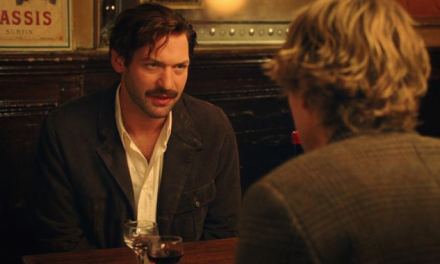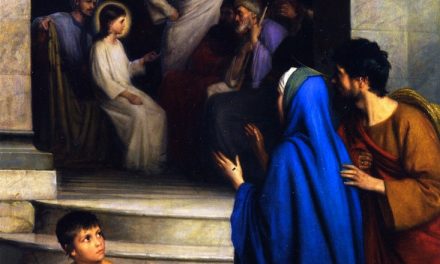The readings for this Sunday may be found on the USCCB website:
What is freedom? What does freedom require? What does it look like? And what, if anything, is the ultimate meaning or purpose of freedom? This Sunday’s readings suggest answers to these questions that seem to be directly at odds with the deepest-held assumptions about freedom in contemporary culture. For most people in secularized Western societies, “freedom” refers to the human capacity for autonomous self-determination. It is an achievement of rational agency, whereby one is able to pursue and achieve one’s practical aims without the hindrance or undue influence of any external constraint. The default view in our culture seems to be that freedom is simply the ability to do as one pleases, and that this ability is itself the crowning achievement of ethical and social development. And so human freedom does not serve or point to any end beyond itself; it is, as Nietzsche famously said, “the will to be responsible to ourselves.”
This week’s readings present a different understanding of freedom. In his letter to the Galatians, St. Paul declares that “for freedom Christ set us free” (Gal 5:1). It is a puzzling statement. Jesus said that “if the Son sets you free, you are free indeed” (Jn 8:36). But if Christ has set us free, as St. Paul seems to presume here, isn’t that enough to say we have truly achieved freedom? From a Christian perspective, could there be anything more or beyond this gift of freedom which Christ gives us? St. Paul seems to think there is something more, since he suggests that our liberation through Christ is for freedom, a freedom not strictly identical with the freedom that we experience when Christ sets us free. To drive the point home, he goes on to say that “you were called for freedom” (Gal 5:13). The idea here seems to be that Christ’s setting us free is not the end of the story of freedom, but the beginning. That Christ has set us free is not an ultimate destination, but a point of departure. Our liberation from the “old self” is not an end in itself, but a call to a “new self” in which our newfound freedom comes to fruition through a new form of life.
In the first reading, the Lord directs the prophet Elijah to a farmer named Elisha, whom he is told to anoint as his successor. From a modern perspective, Elijah here embodies the antithesis of freedom: he is given very specific directions by an external authority as to what he must do, and after he does it he goes on his way, presumably to await further orders. When Elisha asks Elijah if he can kiss his parents goodbye before he leaves to follow him, Elijah seems to recoil at the idea that Elisha would join him. “Go back!” he says, “have I done anything to you?” Elijah acts like a cantankerous functionary, annoyed that he would have to exercise any independent discernment about what he should do after his task was completed. In this context, one could plausibly hear Elijiah say, “Look, I’m just doing my job. What you do from here is up to you; just leave me out of it!”
What Elisha does next, however, is very revealing. He leaves Elijah for a time, and disposes of his oxen and his farming equipment. He realizes that he has received a call, and that this call requires him to leave his old life behind and to embark on a completely new path. He sacrifices the very things that made his old life possible, so that there would be no turning back. Yet the most revealing detail in the story, one I never really appreciated until now, was that he used that sacrifice for the immediate benefit of those around him. He boiled the meat of the oxen with the fire he made from the yokes and plows, “and gave it to his people to eat” (I Kgs 19:21). Elisha realized from the start that this call was not so much for him as for others. He responds to that call by responding to the needs of others. He understood from the beginning that the call wasn’t ultimately about his freedom; it was about God acting through him to liberate others. Here we see the paradox of biblical freedom: true freedom is not simply doing what one wants, but rather abandoning oneself to God, so that His love can reach others.
Freedom is the surrender of self, which sounds very off-putting, but it is also the transcendence and perfection of self. Sartre’s quip that “hell is other people” is certainly understandable, but I think he gets things exactly backwards: the isolated self is most vulnerable to the tyranny of delusion and self-perception. Other people’s aims and needs are annoying not so much because they conflict with our own, but because they hold a mirror up to our true self, to who we really are underneath all our pretensions and self-styled personae. Too often, these false self-images can co-opt even the call to follow Christ.
Why, after all, did the Lord respond so harshly to the one who said to him “I will follow you wherever you go”? “Jesus answered him, ‘Foxes have dens and birds of the sky have nests, but the Son of Man has nowhere to rest his head’” (Luke 9:57-58). The standard interpretation is he is exhorting this would-be disciple to “count the cost,” but perhaps Jesus is also telling this person in so many words, “you have no idea what you are talking about.” Like Ss. James & John’s request to sit at Jesus’ right and left (Mk 10:35-45), and St. Peter’s bold pronouncement that “I will never leave you” (Mt 26:33-35), this would-be disciple’s enthusiasm is motivated primarily by his own view of himself, and his desire to act nobly, even heroically, for his own sake.
In this Sunday’s gospel, Jesus makes it crystal clear that those who wish to follow him must do so promptly and unconditionally. They must leave their old lives behind, even to the extent of abandoning their familial duties. Echoing the story of Elisha’s call, Jesus concludes by saying that “no one who sets a hand to the plow and looks to what was left behind is fit for the kingdom of God” (Luke 9:62). These words come to us a demand, and on the surface they appear to require a complete relinquishing of our freedom. While the requirement to leave everything behind may sound overly harsh and unreasonable to contemporary ears, Christians see in them the only trustworthy path to true freedom.
Earlier in the gospel reading, James and John ask Jesus if they can “call down fire from heaven” to consume the unwelcoming Samaritans they encountered on this journey. While they were thinking according to the logic of vengeance and self-vindication, Jesus knew even then that “the days for [His] being taken up were fulfilled,” that he was already on the way to Jerusalem and to the cross. Jesus knew that once His mission was completed and He returned to the Father, fire would indeed be called down from heaven, but it would not be the fire of destruction, but rather the fire of the Holy Spirit to recreate the world. James and John could not yet understand the mystery of God’s justice, not of true freedom, because for them the achievement of justice and freedom were still a zero-sum game in which one person’s well-being comes only at the expense of another’s. The secret of the freedom for which Christ has set us free is nothing less than self-transcendence that allows us to love our enemies and even to give up our lives for them.
For followers of Christ, the fruit of freedom is not self-determination but self-sacrificing love. To be truly free is to be capable of immersing oneself in the divine current of self-surpassing love. And so only those who surrender their freedom will truly be free. The culmination of human freedom is not the strength to act autonomously, but rather the strength to enter into God’s love poured out into the world. Only by immersing oneself in that love can one escape the tyranny and the burden of making ourselves who we were meant to be. Only through authentic “self-exodus” can one discover the full meaning of freedom. As Pope Benedict XVI put in his encyclical Deus Caritas Est,
“Love is indeed ‘ecstasy’… an ongoing exodus out of the closed inward-looking self towards its liberation through self-giving, and thus towards authentic self-discovery and indeed the discovery of God: ‘Whoever seeks to gain his life will lose it, but whoever loses his life will preserve it’ (Lk 17:33), as Jesus says throughout the Gospels (cf. Mt 10:39; 16:25; Mk 8:35; Lk 9:24; Jn 12:25). In these words, Jesus portrays his own path, which leads through the Cross to the Resurrection: the path of the grain of wheat that falls to the ground and dies, and in this way bears much fruit. Starting from the depths of his own sacrifice and of the love that reaches fulfilment therein, he also portrays in these words the essence of love and indeed of human life itself.”




Trackbacks/Pingbacks